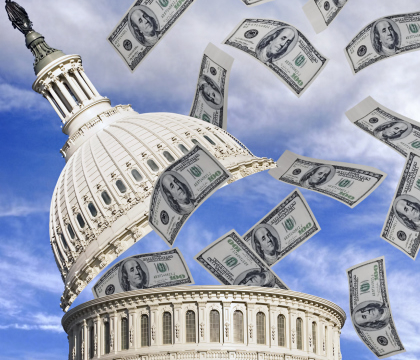The House Appropriations Committee’s draft bill to fund the U.S. Department of the Interior (DOI) and Environmental Protection Agency (EPA), among other agencies, for fiscal year 2019 allocates substantially more funding than President Donald Trump requested.
The bill also includes several “policy riders” that would reverse regulatory actions taken under the prior administration by EPA, the U.S. Fish and Wildlife Service (FWS), and other agencies.
Regulatory Reforms
In a press statement released shortly after the committee approved the bill on May 15, House Appropriations Committee Chairman Rodney Frelinghuysen (R-NJ) said the bill “continues the hand-in-hand work with the Administration to stop economically harmful, unnecessary regulations at the Environmental Protection Agency and others, to make sure core U.S. industries have the opportunities they need to thrive.”
“This bill reflects the Administration’s goal to rein in outdated, unnecessary and potentially harmful regulations at the EPA,” the committee press release states.
Among those policy riders, the draft House bill would “fully repeal” the EPA’s Clean Water Rule: Definition of Waters of the United States (WOTUS), put in place during the Obama administration. This rule expanded the definition of federally regulated wetlands far beyond “the navigable waters of the United States” specified in the U.S. Constitution.
Another policy rider would exempt livestock producers from EPA greenhouse gas regulations on methane emissions.
The bill also has a provision prohibiting FWS from regulating lead in ammunition and fishing tackle, an issue of concern to hunters and anglers.
The bill would also remove recovered gray wolves in Michigan, Minnesota, Wisconsin, and Wyoming from the list of endangered species, ending years of court challenges. It would leave wolf management up to those states.
Riders at Risk
Myron Ebell, director of the Center for Energy and Environment at the Competitive Enterprise Institute (CEI), says he doesn’t think the policy riders will make it into the final legislation.
“The riders always sound good, but very few of them ever get included in the final bill and enacted into law,” said Ebell. “I’ve learned from bitter experience it’s a waste of time to build support for the riders.
“Republicans always cave to pressure from the Democrats and environmental groups, but then try and tell their conservative base they tried really hard,” Ebell said.
Instead of adding regulatory riders rolling back Obama-era rules, Congress should aggressively pursue legislation directly blocking harmful regulations such as WOTUS, Ebell says.
“Wetlands regulation was out of control before WOTUS, which is why we oppose just going back to what was being done before WOTUS,” said Ebell. “We would like to repeal the WOTUS rule and then legislate a constitutional definition of federal jurisdiction of wetlands, which would be much less extensive than pre-WOTUS practice.”
Trump Cuts Ignored
The House Appropriations bill would set spending for the Interior Department at $13 billion, with $8 billion for EPA. The bill appropriates $35.2 billion in funding for these and other environment-related agencies and programs, $7 billion more than the Trump administration requested.
The bill would cut $100 million from EPA’s 2018 spending level, far below the 23 percent spending cut the Trump administration requested for EPA. The Appropriations Committee gave the Interior Department $1 billion more than the administration requested. The Trump administration had asked Congress to reduce DOI’s spending by 5 percent.
Ebell says the spending designated in the House Appropriations draft bill shows Congress refuses to do what’s necessary to reduce regulation.
“The Interior-EPA appropriations bill is a good example of the irresponsibility of Congress,” said Ebell. “The Republican appropriators and leadership want to spend lots of taxpayer money much more than they want to implement President Trump’s regulatory reform agenda.
“The only way to reduce the level of environmental overregulation over the long term is to reduce the number of regulators,” Ebell said. “That requires large budget cuts, which is what the Trump administration has requested for the EPA and other agencies.”
Calls for Vetoes
Ebell says the only way Trump will get the kind of regulatory and spending reform he truly desires is if he starts vetoing spending bills.
“Congress will only be forced to get with the small-government, regulatory-reform program when President Trump starts vetoing appropriations bills,” said Ebell.
Joe Barnett ([email protected]) writes from Dallas, Texas.
Official Connections
Rep. Rodney Frelinghuysen (R-NJ); https://frelinghuysen.house.gov/; https://frelinghuysen.house.gov/index.cfm?sectionid=29§iontree=10,29





